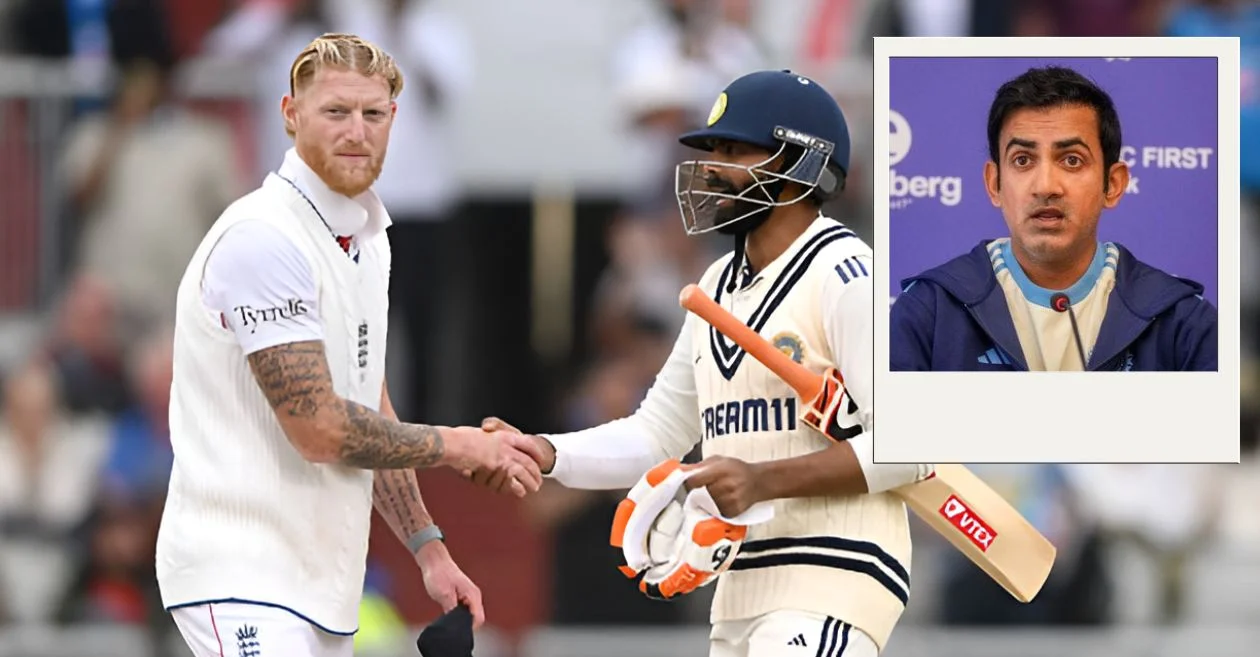What unfolded on the final day of the Fourth Test between India and England at Old Trafford wasn’t just a dramatic fightback—it was a clash of cricketing ethos. As Ravindra Jadeja and Washington Sundar defied the odds to save the match, a controversial handshake refused by the batters sparked heated debate. At the centre of it all: India head coach Gautam Gambhir, who offered a forceful defence of his team’s decision to continue batting—despite England skipper Ben Stokes offering a premature draw with around 15 overs remaining.
The Setting: A Plot Twist Before the Last Hour
India faced an uphill task early on Day 4, trailing by 311 runs after the first innings. But a resilient batting display—led by Shubman Gill, Jadeja, and Sundar—forced England into a defensive position. By Day 5, Jadeja had reached 89 not out, Sundar 80 not out, and a draw was all but certain—the question was whether they’d be allowed to complete their centuries.
At the start of the final hour, Ben Stokes approached the crease offering a handshake and suggesting the match be called off. With centuries in sight, Jadeja and Sundar declined—a decision that apparently left Stokes irritated. What followed was at once a test of will, a moral stand, and an unforgettable display of match awareness.
Gambhir’s Take: A Firm Stand on Principle
At the post-match press conference, Gambhir didn’t mince his words:
“If someone is batting on 90 and the other one is batting on 85, don’t they deserve a hundred? Would they have walked off?” he asked rhetorically.
“If someone from England was batting on 90 or 85 and had the opportunity to get a Test hundred, wouldn’t you allow him to do it?”
He added, starkly:
“They weathered the storm… If they want to play that way, that’s up to them… I think both those guys deserved a hundred—and fortunately they got it.”
Gambhir’s statement reinforced the idea that Jadeja and Sundar earned their milestones through grit, not entitlement—and deserved the closure of personal achievement irrespective of match outcome.
What England Said: Stokes’ Rationale and Regret
Ben Stokes later clarified his motivations:
“As soon as a draw looked inevitable, I wasn’t going to risk my bowlers with the short turnaround (three days until the next Test).”
He conceded that once the match tipped irreversibly, the only viable goal was player management over personal milestones—reiterating that preserving fitness for key bowlers mattered more than a few overs of farewell cricket.
Stokes praised Jadeja and Sundar’s partnership—203 runs off 55.2 overs—that ultimately thwarted England’s series-sealing chance. But he questioned the need for personal milestones when the team result had been secured.
The On‑Field Drama: Jadeja & Sundar Take Control
Instead of accepting the draw, India pressed on. Stokes turned to part-timer Harry Brook, hoping to slip in a few overs, but Jadeja struck him for six to bring up his third Test century. Sundar then completed his maiden Test ton, turning the final session into pure cricketing theatre—much to England’s growing frustration.
On-field chatter revealed heated exchanges. Stokes reportedly remarked to Jadeja, “Do you want to score a hundred against Harry Brook?” And Jadeja’s calm retort: “I can’t do anything.” Moments later, Sundar took a single off Brook to seal his ton, marking the last act of the Test.
Shubman Gill later confirmed the decision was made by Jadeja and Sundar themselves—a choice born from clarity, self-belief, and respect for their craft.
Player & Analyst Reactions
Shubman Gill endorsed the decision:
“A Test hundred is a Test hundred.”
He praised both batters for deserving their extended time at the crease, especially given the mental strain of batting under pressure on Day 5.
Meanwhile, cricket analysts noted the underlying tension:
-
Harsha Bhogle expressed disappointment, suggesting England risked tarnishing the spirit with visible frustration.
-
TV commentators noted unsportsmanlike behavior: Sprouts of verbal altercation captured on stump mics hinted at deeper frustration from England’s camp.
Some social media commentary framed the story as cricket theater, with memes highlighting Stokes’ baffled demeanor—an unintentional selfie of sportsmanship gone wrong.
The Larger Debate: Milestones vs Team Goals
This incident reopened long-standing discussions about:
-
Individual dignity vs team ethics
-
Whether chase for personal milestones should bow to match situations
-
The responsibility of captains to offer the opponent the same courtesies they’d expect: Gambhir’s central question—Would England have walked off if their player was close to a ton?—cuts to the heart of cricketing reciprocity.
-
The sanctity of Test cricket ethos in a results-driven era.
What It Means for the Series
For India
-
A draw brings the series level at 2–1, keeping the final Test at The Oval fully alive.
-
Jadeja (100*) and Sundar (106*) stitched a crucial last stand. Combined with centuries from Gill and Rahul earlier, it’s testament to resilience.
-
Gambhir’s support cements team unity and trust in player-led decision-making.
For England
-
Frustration lingers: missed chances (Joe Root dropped Jadeja early afternoon), fatigue showing in tactical options.
-
Stokes’ decision to protect bowlers reflects longer-term strategy but raises questions about real-time diplomacy.
-
England go into the final Test on anchor, led by a captain whose future decisions may be shaped by this episode.
Stats & Scorecard Quick Overview
| Player | Score |
|---|---|
| Shubman Gill | Century |
| Ravindra Jadeja | 100* |
| Washington Sundar | 106* |
| Partnership | 203 runs (55.2 overs) |
| Series Score | India vs Eng now 2–1 |
Cricketing Ethics Spotlight
The controversy raises essential questions:
-
Is a century truly inconsequential if the match outcome is settled?
Stokes argued yes; Gambhir and many Indian voices said no. -
What’s more vital: team result or completing personal milestones?
Are these mutually exclusive—or part of cricket’s evolving narrative? -
Does a player’s current series contribution justify continued play past draw certainty?
Jadeja & Sundar’s partnership arguably turned the draw into a moral victory.
Who’s Right?
Gambhir’s pointed remarks—“Would they have walked off?”—capture the essence of cricketing reciprocity. If standards are applied to one side, they must apply universally. Jadeja and Sundar earned their tons through application and timing; their refusal was not defiance—it was a legitimate, principled choice.
As Hall of Fame players Drake and others weighed in across press and social media, one thing emerged: the final session at Old Trafford will be remembered not just for wickets denied or points ceded—but for challenging the boundaries of sportsmanship and self-belief.
Please check for information on the best betting sites in India – https://selectory.org/best-betting-sites/















